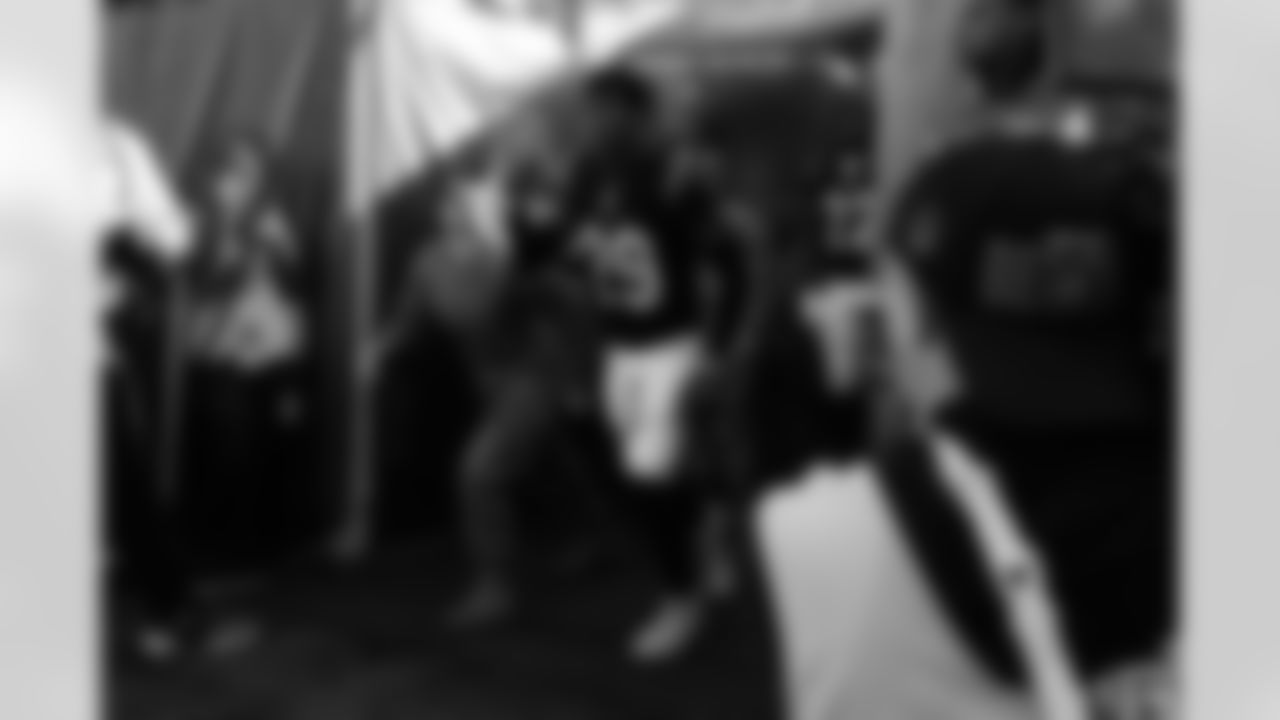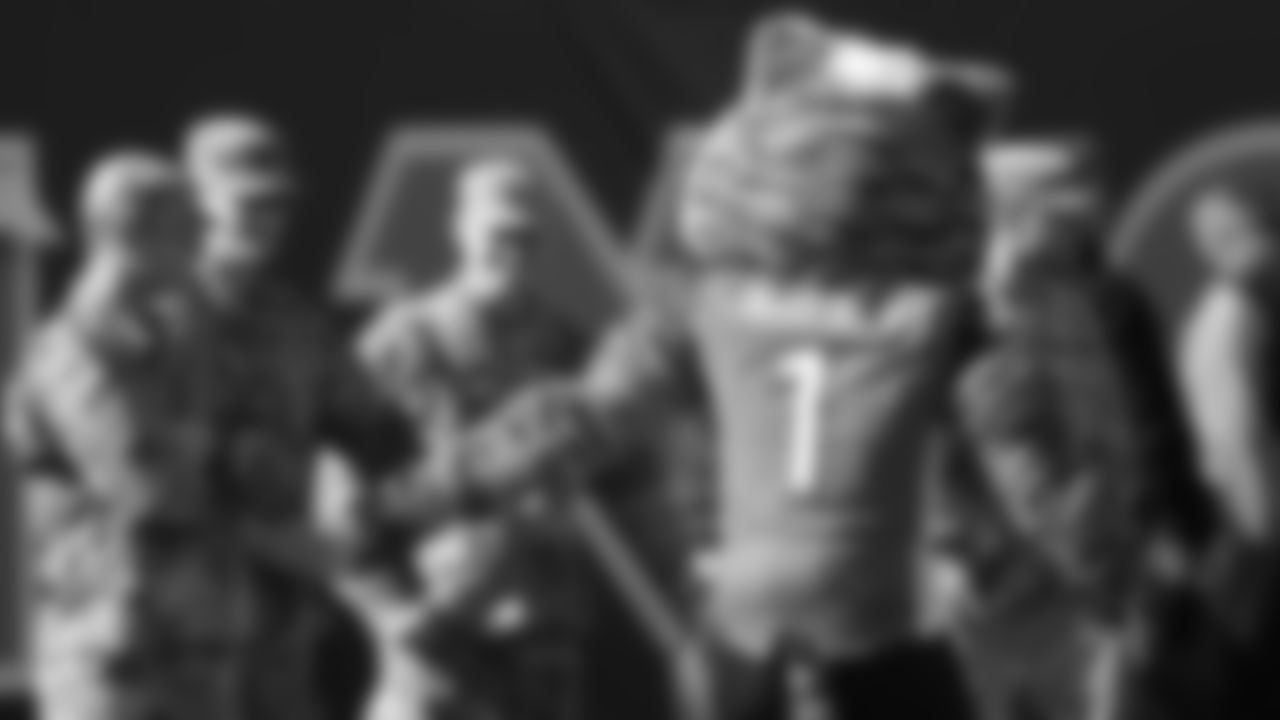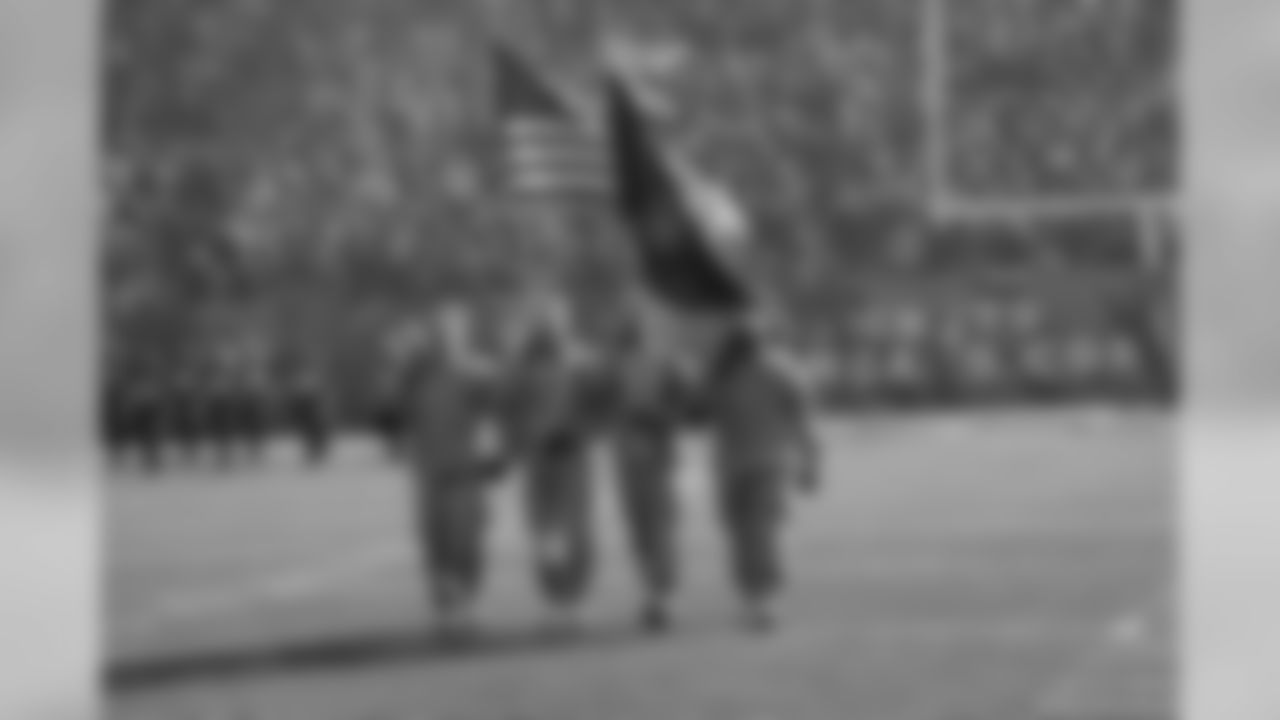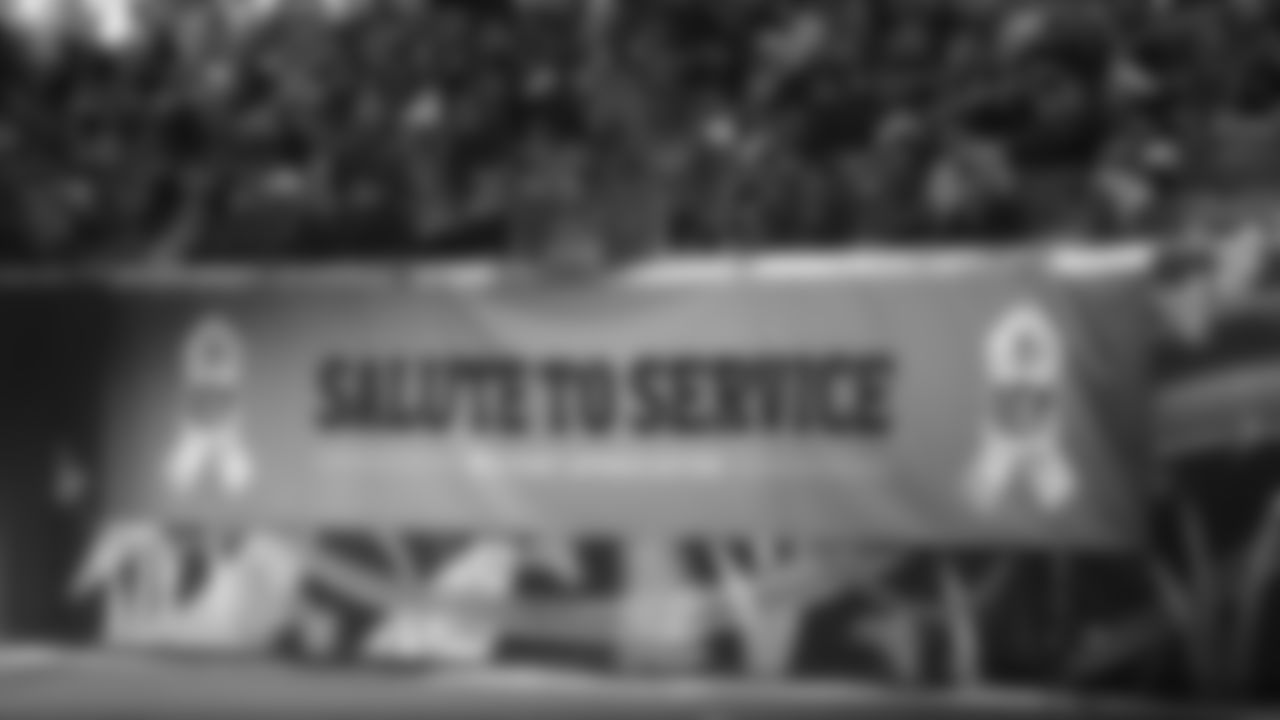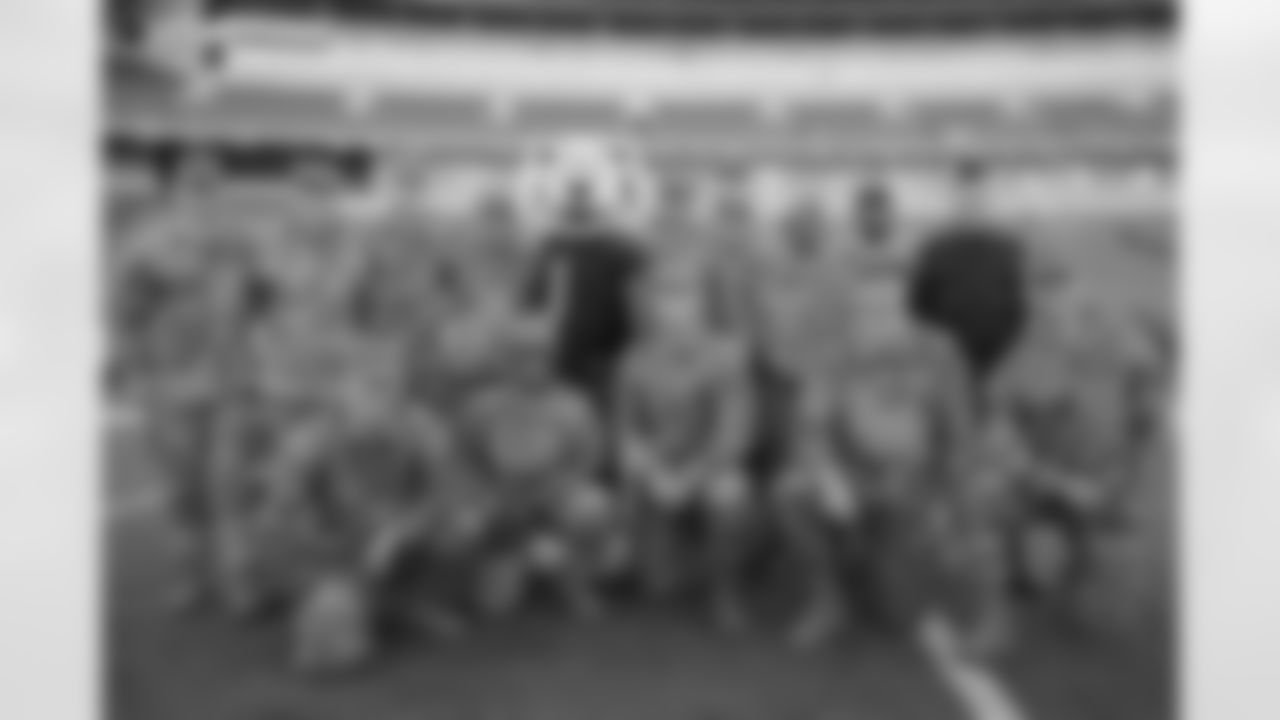Right guard Jalen Rivers, coming off a solid effort against Jets Pro Bowler Quinnen Williams, continues to impress as he prepares to make his sixth NFL start Sunday against the Bears (1 p.m.-Cincinnati’s Local 12) at Paycor Stadium.
Named as the Bengals nominee for the NFL's 2025 Salute to Service Award, Rivers sat down to talk with Bengals.com senior writer Geoff Hobson in this week's conversation. He talks about the impact of the military growing up in a Navy family, as well as learning on the job in the NFL that includes an impromptu chat with quarterback Joe Burrow.
The Conversation
GH: You've been named to rep the Bengals for the NFL's Salute to Service initiative. That must be quite an honor given your background.
JR: It's pretty special, I would have to say. I have three parents who were in the Navy for 20, even 30 years. My mom's been in 26. She was an E8. My stepdaddy was an E9 and did 30. And my dad, he was an E7 and did about 20, 21 years.
GH: Were they ever deployed together?
JR: No. One was always there. Thank God. Luckily, I had three parents. If my mom or stepdad had to go, I would go with my dad.
GH: You and some of your teammates helped install a ramp for a veteran this week. Why did you join?
JR: That means a lot. When (director of player relations) Eric Ball was asking about community service, he put me down for last week, when I was supposed to be playing with the kids. And then he mentioned something with veterans. So that raised my antenna up real quick. I want to do that instead of the Play 60. It means a lot, especially coming from a veteran household.
GH: You were basically raised by a Navy community.
JR: Yeah, I was originally in Virginia, and then we moved to Jacksonville, but surrounded by a lot of Navy. The families would do a barbecue or cookout on base, and you get to meet a lot of people in the military.
GH: Was the military a big impact on you, or was it just kind of on the periphery?
JR: It was big. Growing up, going to a lot of events on base. I really didn't know what my parents did, for real. I just knew they went to work. And then as you get older, you start to ask questions. Having parents in the military, it taught you how to go throughout life. They go through boot camp and stuff like that, and it really opens their eyes a lot, and then it teaches them how to raise their kids, and it taught me how to be a hard-working guy to get whatever I want.
GH: What do you think were some of the lessons that you learned from them?
JR: It's a lot. But I will say the biggest lesson is to never quit, even though it can get hard. I look at them, they raised a family. They had to be deployed away from family for nine, 10 months overseas. As much as you want to quit and be like, I'm done with this, I want to go with family.
No. You'll never quit. There are a lot of times throughout life, and not even just with sports, I'm like, you know, I want to be done with this school. As times get hard, and you just want to pity yourself, you can't. You have to push through because nothing in life is going to come easy. I've always been taught that.
GH: Was there a time when that kicked in, when you had to fight through something when you were on the verge of quitting?
JR: It never once crossed my mind, like I'm going to quit. When things get hard, you say I don't know if I keep doing this. But you snapped back out of it, and I'm going to do it. When I was younger with school, you wanted to get straight A's. I always was a perfectionist and set a high standard for myself. That comes with having your parents disciplining you and expecting the best out of you. And just me, too, just expecting the best of myself. But there were a lot of times I'd get a B and you're studying for a test. This is hard, and you get in the test and I would say, this is hard.
It will go to sports and when I was growing up, if I'm not getting the technique down or something like that. How can I do this? I'm not going to get this down. But I'm the type of person to do whatever it takes to get it down.

Vote For 2025 Salute To Service Award
Vote G Jalen Rivers for the NFL's 2025 Salute to Service Award!
GH: I talked to your stepdad once and I remember him saying you had trouble with math in school.
JR: In elementary school, it was word problems and the algebra with it. But it's weird, because math is one of my favorite subjects. But middle school was hard for me. Just overthinking the word problems. That's a perfect example. Just wanted it to be done with it.
GH: How did you do with that in high school?
JR: I was great. I always had As, high Bs. I finished each semester or each quarter with 95s, 98s. It soon clicked, but I think he'll tell you a story in middle school where it was a long night for me. He wouldn't let me leave the table until I got it down. It was a long night.
I kept trying to ask for help. Just give me the answer. I'm done. I'm done. Nope. You've got to solve it yourself. But that helped me.
GH: What were your final grades in high school? You were an honor student, right?
JR: I finished out with a 4.3 GPA. And I took honors classes. They had this thing called ACE, where you're taking college prep classes, basically, and also doing dual enrollment, so you're already taking college credit classes in high school.
GH: Any of the veterans here take you under their wing on the offensive line?
JR: All of them. I can't even single out just one. We have a great room. So fortunate.
GH: You've probably spent some time at the homes of Orlando Brown Jr., and Ted Karras.
JR: Very helpful. Meetings or texts. They're just a text away. If I have any questions, text them, hit them up. We'll be in the locker room, literally, you see us all in there sitting at our lockers, and we're all talking every single day.
GH: It looked like on Monday Joe Burrow was talking to all the O-line.
JR: There were some things he saw in the game that will help us with the quarterback play. 'If you set up this guy a certain way and position him so we tip the pocket so we won't get hit.' As a lineman, we try to keep the integrity of the pocket. We don't want to do too much and then create too much space.
But he was just saying, hey, that'll be helpful if you saw a guy coming across, pin him or hit him, get something on him so when the quarterback rolls out. You see what he sees on film, and it's great to have your star player that's not playing right now on the bench giving us tips and stuff. It was very helpful.
GH: It looked like it was impromptu. Was it all the linemen, or just the young guys?
JR: It was everybody.
GH: The only time Joe Flacco really got hit on Sunday was it seemed like when the left side, Orlando and guard Dylan Fairchild, passed off a stunt, and the guy had to come all the way around on the other side as Flacco tried to extend.
JR: Just getting an extra shove or push on the guy. We can't see him extending. Our backs are to him. But just to anticipate it. it's good to know.
GH: I thought you guys played really well up front on Sunday.
JR: We're just building each week. I feel like watching the film, of course, every game, every practice, you see something you've just got to fix and grow with. But I feel like, as a whole, I mean, look at our running game. It's getting better each week. Our pass pro, like you said, they only got that one sack. He only got hit that one time. I feel like we're finally gelling and clicking.
GH: Do you think that's the best game you guys have played?
JR: Yeah, but we've just got to keep growing from that. I feel like so far, we don't look at it as our best game. We just have to have a better game than that next week.
GH: On Samaje Perine’s 32-yard touchdown run, you had a nice one-on-one block on three-time Pro Bowl Jets defensive tackle Quinnen Williams. It looked like you hung with him all game.
JR: I had to do what I had to do against him. It just shaped up on that play, I had to be one-on -one against him. In this league, you've got to go against the best of the best. You can't shy away from it. A lot of times, you're going to be one-on-one.
I give him all the respect. Because, like you said, how many times a Pro Bowler? I mean, as a rookie, you look at the reps against him. Some good, some bad, or whatever the case may be. But you have to give him all the respect because he's been a great player in this league.
GH: You came in as a tackle. Are you surprised you're starting as a guard?
JR: No. Throughout the whole draft process, talking to really the whole league, when I was talking to a lot of the teams during the draft, they saw me as a guard that can play tackle. I can play both, but really more so long-term as a guard. I wasn't surprised when I went to the right guard spot.
I feel like I'm getting more comfortable each game. So I just have to keep going.
GH: What's been the biggest adjustment from the pros to college?
JR: For me, it's not a super big adjustment. I mean, now it's your job. I wasn't like this. But what I see people do in college, they can't get away with it in the league because that's your money you're playing with, and you can get fired any time. You can get cut and released. You've got to really be on your Ps and Qs and really come in, and you can't half do it. You've got to come in, put your best foot forward. You might get away with a lot of stuff in college, but you can't get away with it now, because you play on people's money and your money and playing with people's franchises, and you can't.
I think the biggest thing for me, I just came in, trying to be consistent. In your rookie season, if you just put your best foot forward every day, you'll be fine.
GH: Since you came in playing tackle, how has Orlando helped you?
JR: He's helped me since I got drafted. He literally sent me a text as soon as I got drafted. He just gives me tips on what he sees. He's been in the league for a minute now, like (eight) years. And throughout OTAs throughout preseason, training camp, to now, the little things he sees on tape or on the field, he's like, 'Hey Jay, I think you can try this technique,' or just feeding me a lot of food for thought.
GH: What's the best piece of advice Teddy or Orlando has given you?
JR: Honestly, just literally, every day, just play your game. There are going to be a lot of coaching points thrown at you, and as a rookie, you're trying to retain it all and just be perfect. But just go out there and have fun. It'll come. From Coach Scott (offensive line coach Peters), from Ted, from OB, whoever is giving you advice, don't try to soak it all in. You'll play slower and play mechanical or robotic. No. Go out there and it'll come. Don't overthink. Just play your game and you'll continue to grow.
GH: What was your GPA in college?
JR: 3.8
GH: What are your favorite subjects?
JR: In high school, it was math, it was reading. History. That kind of hurt my head, because we had a president's test. It was a bunch of history. But it was very informative and very interesting. I really liked it. But that's third or fourth for me. I became really good when it came to essays.
GH: Didn't you write some poetry?
JR: I did. Not anymore. That stopped about mid-high school
GH: How come?
JR: Just time. It wasn't a thing I kept pursuing. I could, if I start up again, start writing a journal or something, but I just found other interests.
GH: Like what?
JR: Reading. Maybe in the offseason I'll get back to that. But football, this is my job now. So I'm doing everything with that, studying the playbook, looking at film.
GH: What was your major at Miami?
JR: Sports administration. I got my master's in that as well.
GH: Any thoughts on what you might do with that?
JR: There's a lot of stuff I want to do. I want to stay in the sports world after football. One of the thoughts was to go to law school and become a sports attorney. Maybe an agent. I do want to do something in the front office in an administrative role for an NFL team or maybe a college team. I have two degrees for it. I have the knowledge for it.
View the best photos from the Bengals and their Salute to Service efforts over the years



